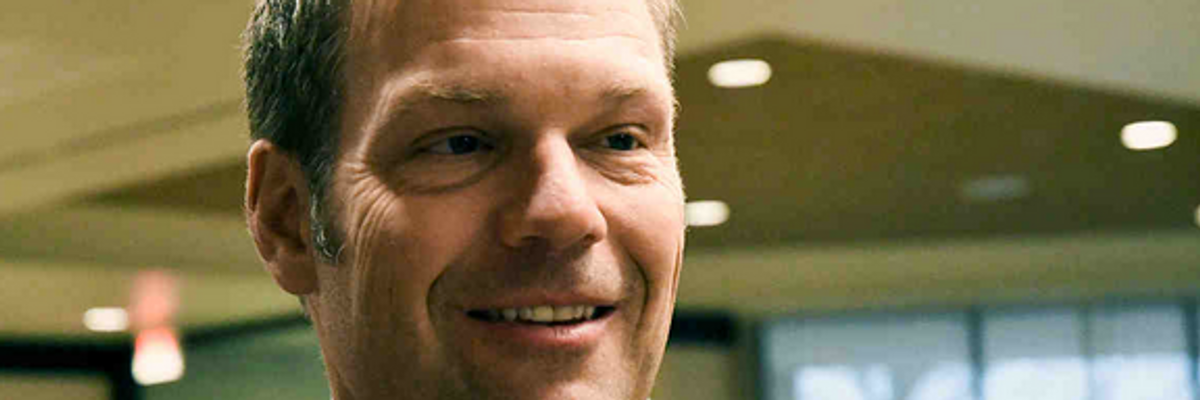Kris Kobach is getting desperate. In a column last week for Breitbart, the Kansas Secretary of State declared that voter fraud tipped the scales in the election last year in New Hampshire.
The evidence?
Anyone who registered to vote on Election Day with another state's drivers' license and didn't get a New Hampshire license within 60 days was an illegitimate voter and, according to Kobach's apparently psychic powers, most likely a Democrat!
Registering to vote and casting a ballot in New Hampshire while having a driver's license from another state is legal. In fact, the New Hampshire Supreme Court settled this debate in 2015, finding that registered voters do not have to get a New Hampshire license within 60 days.
It appears that the vice-chair of the Presidential Advisory Commission on Election Integrity does not understand the election laws of New Hampshire, where his commission will be meeting on Tuesday.
Many people, for various reasons, choose not to go to the DMV to get a new license upon moving to a new state, most commonly, college students from out-of-state who live on campus and don't drive. Unsurprisingly, New Hampshire voters who have out-of-state licenses live most frequently in college towns. But according to Kobach, such voters committed fraud. Besides Kobach's own egregious and badly flawed argument, there are no signs of voter fraud taking place in New Hampshire.
We have seen similarly specious arguments from other purveyors of the voter fraud myth. For example, Donald Trump has conflated being registered to vote in more than one state with voter fraud. Kobach was once in trouble for claiming a dead voter had cast a ballot, despite the fact he was very much alive.
Kobach's decision to write as a paid columnist for Breitbart, which Bannon called "the platform for the Alt-Right," is raising questions of its own: George W. Bush's ethics lawyer Richard Palmer told The Huffington Post that Kobach could be in violation of federal conflict of interest statutes by "getting paid by somebody to write about your official duties."
Naturally, Kobach has stacked the panel of witnesses for his commission's second official meeting with fellow voter fraud conspiracy theorists, including Robert Popper, John Lott, Ken Block, Donald Palmer, and Hans von Spakovsky, to testify to the commission.
Popper, the director of Judicial Watch's Election Integrity Project, has threatened to sue states and counties unless they purged their voter rolls of supposedly ineligible voters. Advocates feared that the move targeted communities of color. Lott has a record of pushing discredited "analyses" about the 2008 Minnesota Senate race, erroneously blaming voter fraud for the Republican incumbent's defeat.
Block, for his part, recently authored a report on people voting in more than one state for the Government Accountability Institute, an organization founded by Bannon, which relied on a consumer database to suggest that there were over 8,000 cases of duplicate voting in the last election. Palmer, the former Virginia State Board of Elections secretary, similarly tried to hunt for supposed duplicate voting. Instead he ended up mistakenly sending 125,000 Virginia voters a notification that wrongly claimed that they were registered to vote elsewhere. He blamed it on an "administrative error."
Von Spakovsky, who is also a member of the commission, made it his life's work to suppress voting rights, particularly the rights of people of color. He regularly cites a 2010 Missouri State House election as proof that voting by noncitizens is rampant in elections, claiming that it was decided by votes "cast illegally by citizens of Somalia." However, a court couldn't find any evidence of such misconduct. His employer, the Heritage Foundation, once tried and failed to find a significant amount of cases of voter impersonation.
Incidentally, there are more people on Kobach's commission than people the Kansas secretary of state has convicted of voter fraud.
As the Lawyers' Committee for Civil Rights Under Law has also pointed out, all of the people testifying at the meeting are white men, despite the fact that election irregularities and abuses (and the voter suppression measures backed by Kobach) disproportionately affect people of color.
But Kobach's problems don't end there. It was recently revealed that members of the commission have been using their personal email addresses for official duties, a potential violation of the Presidential Records Act that raises further questions about the commission's transparency.
A federal judge recently reprimanded Kobach for failing to comply with federal disclosure laws, which the commission's lawyer downplayed as an "honest misunderstanding." Back in June, Kobach offered a similar explanation in a lawsuit with the ACLU where he was sanctioned and fined $1,000 for misleading the court about a document he brought to a meeting with Trump, dismissing his wrongdoing as another "misunderstanding."
Of course, Kobach has prosecuted people for making honest mistakes, all as part of his quest to justify voter suppression. It's dirty work, but someone like Kobach is more than eager to do it.
